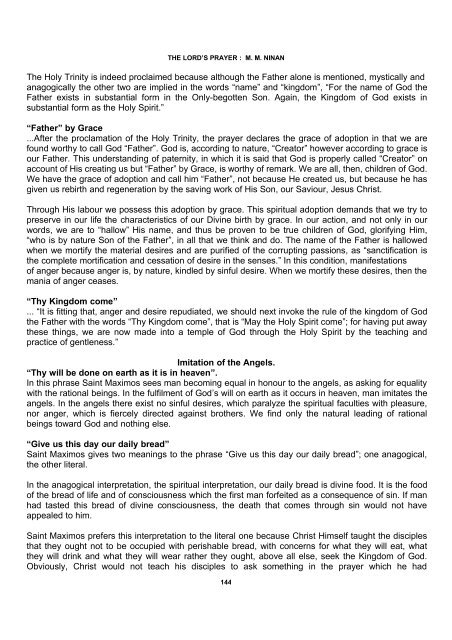Lord's Prayer
You also want an ePaper? Increase the reach of your titles
YUMPU automatically turns print PDFs into web optimized ePapers that Google loves.
THE LORD’S PRAYER : M. M. NINAN<br />
The Holy Trinity is indeed proclaimed because although the Father alone is mentioned, mystically and<br />
anagogically the other two are implied in the words “name” and “kingdom”, “For the name of God the<br />
Father exists in substantial form in the Only-begotten Son. Again, the Kingdom of God exists in<br />
substantial form as the Holy Spirit.”<br />
“Father” by Grace<br />
...After the proclamation of the Holy Trinity, the prayer declares the grace of adoption in that we are<br />
found worthy to call God “Father”. God is, according to nature, “Creator” however according to grace is<br />
our Father. This understanding of paternity, in which it is said that God is properly called “Creator” on<br />
account of His creating us but “Father” by Grace, is worthy of remark. We are all, then, children of God.<br />
We have the grace of adoption and call him “Father”, not because He created us, but because he has<br />
given us rebirth and regeneration by the saving work of His Son, our Saviour, Jesus Christ.<br />
Through His labour we possess this adoption by grace. This spiritual adoption demands that we try to<br />
preserve in our life the characteristics of our Divine birth by grace. In our action, and not only in our<br />
words, we are to “hallow” His name, and thus be proven to be true children of God, glorifying Him,<br />
“who is by nature Son of the Father”, in all that we think and do. The name of the Father is hallowed<br />
when we mortify the material desires and are purified of the corrupting passions, as “sanctification is<br />
the complete mortification and cessation of desire in the senses.” In this condition, manifestations<br />
of anger because anger is, by nature, kindled by sinful desire. When we mortify these desires, then the<br />
mania of anger ceases.<br />
“Thy Kingdom come”<br />
... “It is fitting that, anger and desire repudiated, we should next invoke the rule of the kingdom of God<br />
the Father with the words “Thy Kingdom come”, that is “May the Holy Spirit come”; for having put away<br />
these things, we are now made into a temple of God through the Holy Spirit by the teaching and<br />
practice of gentleness.”<br />
Imitation of the Angels.<br />
“Thy will be done on earth as it is in heaven”.<br />
In this phrase Saint Maximos sees man becoming equal in honour to the angels, as asking for equality<br />
with the rational beings. In the fulfilment of Godʼs will on earth as it occurs in heaven, man imitates the<br />
angels. In the angels there exist no sinful desires, which paralyze the spiritual faculties with pleasure,<br />
nor anger, which is fiercely directed against brothers. We find only the natural leading of rational<br />
beings toward God and nothing else.<br />
“Give us this day our daily bread”<br />
Saint Maximos gives two meanings to the phrase “Give us this day our daily bread”; one anagogical,<br />
the other literal.<br />
In the anagogical interpretation, the spiritual interpretation, our daily bread is divine food. It is the food<br />
of the bread of life and of consciousness which the first man forfeited as a consequence of sin. If man<br />
had tasted this bread of divine consciousness, the death that comes through sin would not have<br />
appealed to him.<br />
Saint Maximos prefers this interpretation to the literal one because Christ Himself taught the disciples<br />
that they ought not to be occupied with perishable bread, with concerns for what they will eat, what<br />
they will drink and what they will wear rather they ought, above all else, seek the Kingdom of God.<br />
Obviously, Christ would not teach his disciples to ask something in the prayer which he had<br />
144


















